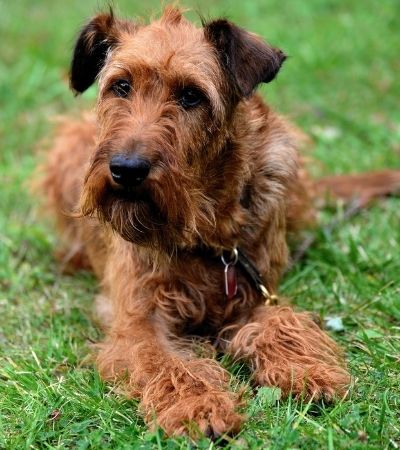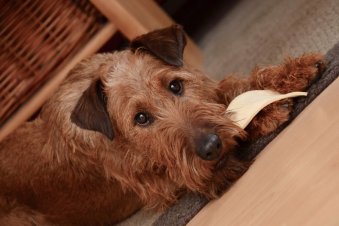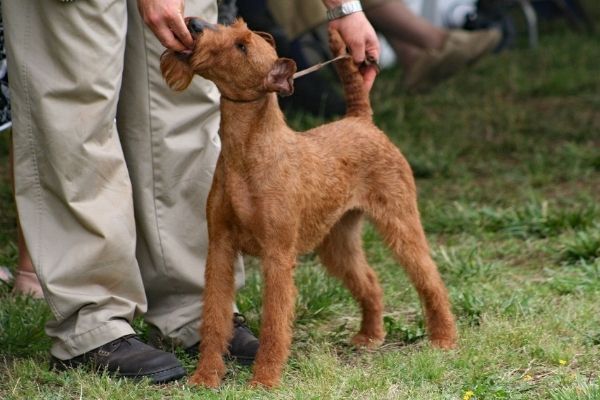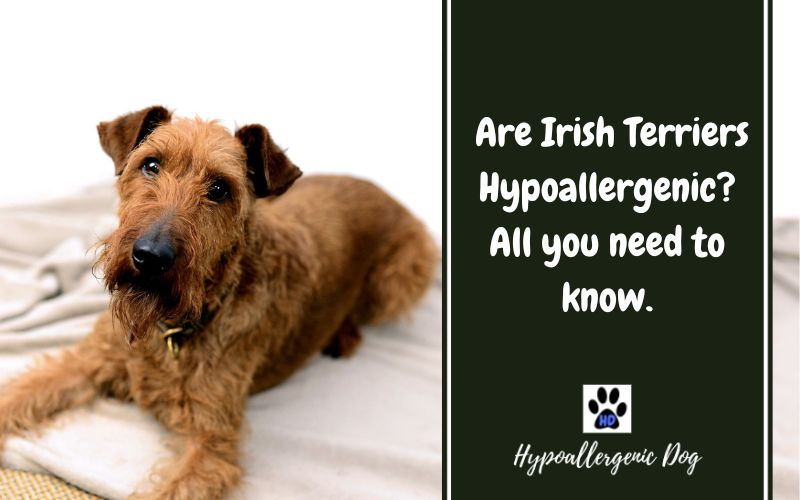Are Irish Terriers Hypoallergenic?
Yes! The Irish Terrier is a medium-sized hypoallergenic dog that hardly drools or sheds.
Irish Terriers were used as messenger dogs and sentinels during World War I, receiving many praises of loyalty, as well as bravery. Lt. Col. E. H. Richardson, who was the British War Dog School’s commandant, wrote this about Irish Terriers: “They are extraordinarily intelligent, faithful, and honest, and a man who has one of them as a companion will never lack a true friend.”
The Irish Terrier has slowly faded in popularity since then, but many have no reason as to why. They are not in the show ring very often unless it is a specialty show. The 2007 movie Firehouse Dog gave their popularity somewhat of a boost. Irish Terriers rank 123rd among the 155 breeds and varieties registered by the AKC.
For a quick summary of the Irish Terrier skip to our Irish Terrier dog breed summary further down the page.
Irish Terrier Quick Facts

This breed’s dense, wiry hair is short enough to still see the outline of the body, but because the hair grows extremely close together, seeing the skin beneath the coat is near impossible. The Irish Terrier’s coat is considered hypoallergenic, in that it hardly sheds, and releases less dander than many other breeds, making them a good choice for people who suffer from allergies and wish to own a dog. Additionally, their double coat protects them from underbrush, snow, and rain, with the fine, soft hair of the undercoat providing a much needed extra layer of protection in cold and wet weather.
Irish Terriers come in a variety of colors like bright red, golden red, red wheaten, or wheaten (pale yellow or fawn). At birth though, Irish Terriers can sometimes have black hair, which will fade eventually as they get older.
Irish Terriers are even-tempered, alert, lively and adapt well to change. They do pick fights with other dogs sometimes because they are so smart, independent and strong-willed. With humans, however, everyone is a friend to them!
Socialization, heredity, and training can all be factors in their temperament. Meeting the parents and siblings of an Irish Terrier puppy will tell you a lot about what they will be like in the future as well. If a puppy is beating up on his/her siblings, it’s best not to go with that one. Instead, look for the pup who is curious, playful, approaches you and is willing to be held. Early socialization is extremely important in this breed in order to assure that they end up well-rounded. Walks and puppy play dates can help a lot with this. They even have doggy kindergartens if that is the route you choose.
Are you considering adopting a Irish Terrier?
- Can be hard to find a breeder to buy from
- Low shedding
- Friendly towards humans, but don’t like to be alone
- Prefers to be the only pet in the household

Irish Terrier Training and Exercise
Encouraging Good Behavior In Your Irish Terrier
Needs loving but firm discipline and socialization starting from a young age. You will have to work around their independent personality to train them, but they are quick learners due to their high intelligence. If their behavior isn’t under control from the start, they will take over the house and can also become excessive barkers. This breed loves to compete and make excellent hunters and show dogs.
Irish Terrier Exercise Needs
Irish Terriers need exercise in the form of long walks, playtime outdoors and even just running around carefree in a securely fenced yard. Be sure to leash them when walking or they will chase all the small animals you come across and pick fights with other dogs. Sometimes, they are impulsive and don’t really think about where the chase will take them either.
To keep their coat clean and healthy, they need weekly brushings with a natural bristle brush. In order to maintain the bright color and hard texture of their coat, they require hand-stripping a couple of times a year, especially if they are show dogs. For companions, it’s perfectly acceptable to simply clip, but be aware that the texture will be softer and the colors more muted. If you don’t mind them being a bit scruffy, you can skip stripping and clipping, sticking to brushing instead.
Teeth, Ears and Nails
Irish Terriers, as well as all other dogs, need their teeth brushed at least 2-3 times a week to keep the tartar and plaque at bay, but daily is preferred. Their nails need to be trimmed 1-2 times per month or as needed. If you can hear their nails on the floor, it is time to cut them because it keeps their nails from splitting and tearing. Their ears may need to be “trained” to properly fold, which involves having a breeder show you how to tape or glue their ears to their head at 4-8 months of age.

The Irish Terrier is most generally a sturdy breed and doesn’t usually have any common health issues, but there are some things to be aware of that are always a possibility if they inherit something from their parents. Hyperkeratosis, which is a hardening and cracking of calluses on their paws, is not common in North America, but it all depends on the genes and breeding. These can be serious as they can lead to infections if not treated in time. Another important thing to look out for is Cystinuria, which are stones that can form in the bladder, kidneys or ureter. These can be quite painful and also lead to infections. If you notice anything off about your dog, seek out a vet that you trust.
Here are the tests Irish Terrier breeders should perform :
- Orthopedic Foundation for Animals (OFA) for hip dysplasia (a score of fair or better)
- Elbow dysplasia (OFA)
- Hypothyroidism (OFA)
- Von Willebrand’s disease (OFA)
- Auburn University for thrombopathia
- The Canine Eye Registry Foundation (CERF) certifying that eyes are normal.
This stubborn breed does not play well with other dogs as they like to be the one in charge and they do not back down from challenges. However, they do love their humans and to them, no one is a stranger. They will try to take over the household unless you establish firmly and repeatedly that you are the boss of the house. Consistency with training is key as far as obedience is concerned. They are highly intelligent and can learn various commands. However, “come” is sometimes difficult for them to understand due to their stubborn streak.
They need a way to burn off excess energy every day and also enjoy mental stimulation to keep them on their toes. Irish Terriers are very loveable but can be hard to find due to their surprising lack of popularity. They are anxious dogs that don’t like to be left alone too long or they will start destroying things. Irish Terriers thoroughly enjoy their human companionship and can sometimes get separation anxiety if they are left to their own devices.

Is the Irish Terrier aggressive?
It depends. Only aggressive towards other dogs, especially of the same sex, because they try to show their dominance.
Are Irish Terriers friendly?
Yes. They are even friendly towards strangers.
Is the Irish Terrier a pedigree?
Yes. They are purebred as long as they come from a valid breeder.
Is the Irish Terrier good with cats?
No. They love to chase small animals.
Does the Irish Terrier shed?
Rarely. If they are properly groomed, there is minimal shedding, but without grooming, they shed more.
Where does the Irish Terrier come from?
They were originally created in Ireland
Are Irish Terriers hyper?
No. They have high energy, love to play, enjoy investigating and love to chase squirrels and other small animals, including other family pets, but they are not hyper.
Are Irish Terriers good with babies?
Yes. But they should be supervised just in case they get too excited.
Are Irish Terriers good with kids?
Yes. They love their whole family!
Do Irish Terriers like water?
Yes. Most are excellent swimmers and love the water, but it varies from dog to dog.
Can Irish Terriers be left alone?
No. They get very anxious if their humans leave them alone for too long and will get destructive to calm their nerves.
Do Irish Terriers bark a lot?
It depends. They love they sound of their own bark, but can be trained to not bark as much.
Do Irish Terriers howl?
It depends. They more of a tendency to bark than to howl, but it varies from dog to dog.
Irish Terrier Facts Summary
| Breed | Irish Terrier |
| Other Names? | Daredevil, Irish Red Terrier, Kerries |
| Hypoallergenic? | Yes |
| Height | 12.6-12.8 inches (32-32.5 cm) |
| Weight | 25-27 pounds (11.34-12.23 kg) |
| Lifespan | 12-16 years |
| Temperament | Tough, animated, curious, independent, spunky, intelligent, fast learner |
| Colours | Bright red, golden red, red wheaten, or wheaten (pale yellow or fawn) |
| Coat – describe the coat | Dense and wiry coat with a soft fine undercoat |
| How much grooming? | Brush weekly; hand stripping or clipping recommended for show dogs |
| How much shedding | Medium levels. Varies from dog to dog |
| Dander levels | Little if properly groomed |
| Saliva – Do they Drool or Lick much? | No. Very little drool and licking |
| Energy levels | High. Always ready for action or playtime. |
| How much exercise do they need? | A lot of vigorous daily exercise. Very active, lots of stamina. |
| Health problems | Does not have common health problems, but some are susceptible for two hereditary diseases: Cystinuria and Hyperkeratosis. Get health clearances to be sure your dog is healthy. |
| Good for apartment? | Yes. As long as they are exercised regularly. Can be hard to house-train however. |
| Suitable for kids? | Yes, as long as they’re trained to not play too rough. |
| How much do they bark? | It depends. If they are trained to control their barking unless they’re alerting you of danger, they only bark a little. Varies dog to dog. |
| Can they be left alone? | Not for long periods as they are anxious and panic if you don’t return right away |
| Intelligent? | Yes, Highly intelligent |
| Trainable? | Yes, but patience is needed. They work for rewards. |
| How popular as a pet? | Not very. It’s hard to find a breeder who has a litter ready |
| Any other important facts? | They will take over the household if you let them as they try to be dominant. Be sure to train the to know you are the boss. |








